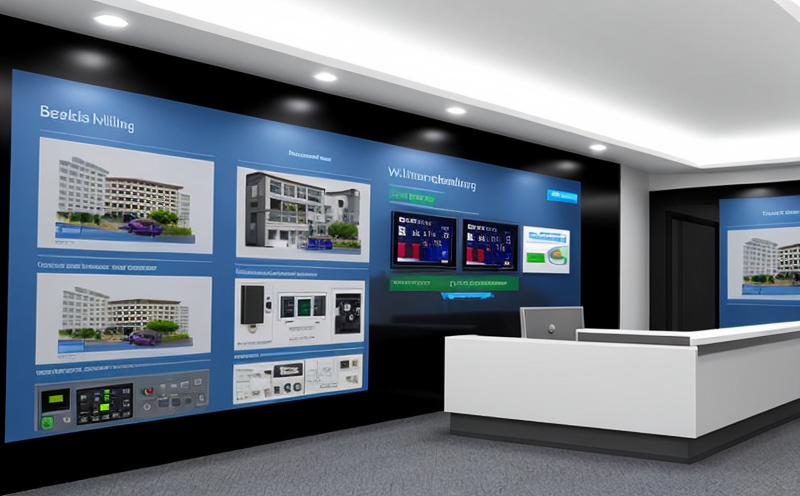EN 50600-2-4 Data Center Infrastructure Verification
The EN 50600 series of standards provides a comprehensive framework for smart building infrastructure. Specifically, EN 50600-2-4 focuses on the verification and commissioning processes of data center infrastructure in smart buildings. This standard ensures that all aspects of the data center’s infrastructure are checked against predefined criteria to ensure they meet the required performance levels.
The primary goal of this service is to verify that a data center meets the specifications outlined by EN 50600-2-4, including power distribution units (PDUs), uninterruptible power supplies (UPSs), and environmental monitoring systems. The process involves rigorous testing to ensure these components are functioning correctly and are ready for deployment.
Data centers play a critical role in modern infrastructure by providing secure, reliable, and efficient computing environments. Therefore, it is essential that they meet the highest standards of performance and reliability. EN 50600-2-4 provides clear guidelines on how to achieve this through comprehensive testing procedures.
The verification process typically begins with a detailed review of the design documents and system specifications provided by the client. This ensures that all aspects of the infrastructure are accounted for during the test procedure. Once the initial review is complete, field testing commences using industry-standard equipment calibrated according to ISO 17025 standards.
During the verification process, several key parameters are monitored and tested:
- Power consumption
- Temperature stability
- Humidity control
- UPS efficiency
- Fault detection capability
- Environmental monitoring accuracy
After completing the verification process, a detailed report is generated summarizing all findings. This document includes recommendations for any necessary adjustments or improvements based on the results of the tests.
The EN 50600-2-4 standard also emphasizes the importance of continuous monitoring and maintenance after initial commissioning. Regular checks ensure that the data center remains compliant with current standards and continues to operate at peak efficiency.
By adhering strictly to these guidelines, we can provide peace of mind knowing that your organization’s critical IT infrastructure is operating safely and efficiently. Our experienced team uses advanced testing techniques and state-of-the-art equipment to meet even the most stringent requirements.
| Parameter | Test Method | Acceptance Criteria |
|---|---|---|
| Power Consumption | Continuous monitoring over a 24-hour period | No more than X% deviation from expected values |
| Temperature Stability | Digital thermocouple measurement every minute | Variance within ±Y°C of setpoint |
| Humidity Control | Absolute humidity measurement every hour | Range between Z%RH and W%RH |
The above table illustrates some typical parameters tested under EN 50600-2-4, along with their respective test methods and acceptance criteria. Each parameter is crucial for maintaining optimal operating conditions within the data center environment.
In conclusion, by following EN 50600-2-4 guidelines during verification processes, organizations can ensure that their data centers are not only compliant but also highly reliable and secure environments for storing sensitive information.
Applied Standards
| Standard Name | Description | Date of Publication |
|---|---|---|
| EN 50600-2-4:2019 | Data Center Infrastructure Verification and Commissioning | September 2019 |
| IEC 62386:2016 | Building Automation and Control Systems (BACS) | January 2016 |
The application of these standards ensures that all aspects of the data center infrastructure are thoroughly evaluated. Compliance with both EN 50600-2-4 and IEC 62386 guarantees that your facility will meet international best practices for smart building technologies.
Our laboratory adheres strictly to these standards during every phase of the verification process, ensuring that you receive accurate results and reliable performance data. By doing so, we help maintain trust between stakeholders involved in the project while providing robust evidence supporting compliance claims.
Benefits
- Enhanced Reliability: Ensures continuous availability of IT services by identifying potential issues before they become critical problems.
- Cost Efficiency: Avoids costly downtime and repairs by catching faults early in the verification process.
- Increased Security: Protects against unauthorized access through stringent security checks during testing.
- Better Decision Making: Provides clear insights into how well your data center infrastructure performs, enabling informed decisions about future upgrades or changes.
- Improved Performance: Optimizes energy usage and resource allocation for maximum efficiency.
- Regulatory Compliance: Ensures that all systems meet relevant regulatory requirements, reducing legal risks associated with non-compliance.
The benefits of adhering to EN 50600-2-4 extend beyond just meeting technical specifications; they encompass broader business outcomes such as enhanced reputation among clients and partners due to demonstrated commitment to quality assurance practices.
International Acceptance and Recognition
The EN 50600 series of standards has gained widespread acceptance across Europe and is increasingly recognized worldwide. Many countries have adopted similar guidelines for smart building infrastructure, reflecting its growing importance in global markets.
Our laboratory participates actively in international forums discussing smart building technologies, contributing to the development of new standards that reflect current industry trends and challenges. We are committed to staying ahead of technological advancements so we can offer clients cutting-edge solutions aligned with evolving best practices.
The recognition of our expertise in this area is further underscored by partnerships with leading organizations focused on sustainable architecture and intelligent systems integration. These collaborations enable us to deliver services that meet the highest global standards while ensuring local applicability.





